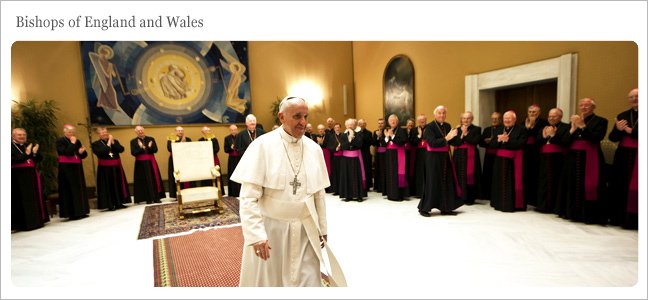The bishops should follow Peter
Loyalty to the papacy – even to the point of martyrdom – has been a distinguishing mark of Catholics in these islands since the Reformation. If their leaders now show signs of drifting away from that allegiance, they may need to be gently pulled back to it by their own people. And, sadly, this does describe what seems be happening regarding the teaching of Pope Francis on family life. The Pope’s teaching on the admission of divorced and remarried Catholics to Holy Communion in his apostolic exhortation, Amoris Laetitia, should have their unhesitating support.

The Pope is faithful in all respects to the Church’s tradition. There is no better evidence for this than the equivalent document from Pope John Paul II, Familiaris Consortio, which was, like Amoris Laetitia, a response to a discussion of family life at a synod of bishops, in that case the general synod of 1980. The Bishops’ Conference of England and Wales had studied the matter in advance, and after lengthy discussion came to the view that the synod should endorse what was already long-standing and widespread practice: that in certain circumstances, divorced and remarried Catholics should be readmitted to Holy Communion. Archbishop Derek Worlock of Liverpool was despatched to present the case.
This was, essentially, that not every Catholic who was divorced and remarried was an adulterer in a state of mortal sin, and automatically barred from Communion for that reason. That discernment was usually exercised in the “internal forum” – within, that is to say, the administration of the Sacrament of Reconciliation. Familiaris Consortio followed Worlock’s line exactly, when it stated: “Pastors must know that, for the sake of truth, they are obliged to exercise careful discernment of situations. There is in fact a difference between those who have sincerely tried to save their first marriage and have been unjustly abandoned, and those who through their own grave fault have destroyed a canonically valid marriage. Finally, there are those who have entered into a second union for the sake of the children’s upbringing, and who are sometimes subjectively certain in conscience that their previous and irreparably destroyed marriage had never been valid.”
The problem comes with what Pope John Paul II said next. He did not say “nevertheless they are all still guilty”. He said they were barred from Communion because “their state and condition of life objectively contradict that union of love between Christ and the Church which is signified and effected by the Eucharist.” But these two teachings from the same document are mutually contradictory. Either priests and people have to exercise discernment, or they do not.
And it has to be said that Pope John Paul II’s argument was a novel one, not backed by tradition nor recommended by the synod to which he claimed to be responding. Before he uttered it, no papal encyclical nor Council of the Church had said such a thing. By failing to repeat it in Amoris Laetitia, Pope Francis was acknowledging it as an opinion, not a doctrine. It was, so to speak, a moment of correction, not of deviation.
The head of the Vatican body responsible for this area, Cardinal Kevin Farrell, has made it perfectly clear in an interview with Christopher Lamb of The Tablet that the line taken by Amoris Laetitia is now settled official teaching. All that is missing is firm endorsement of this by numerous bishops’ conferences which have been hanging back, including the conference of England and Wales. It is surely time they returned to the traditional position their predecessors had adopted before the 1980


 Votes : 0
Votes : 0









